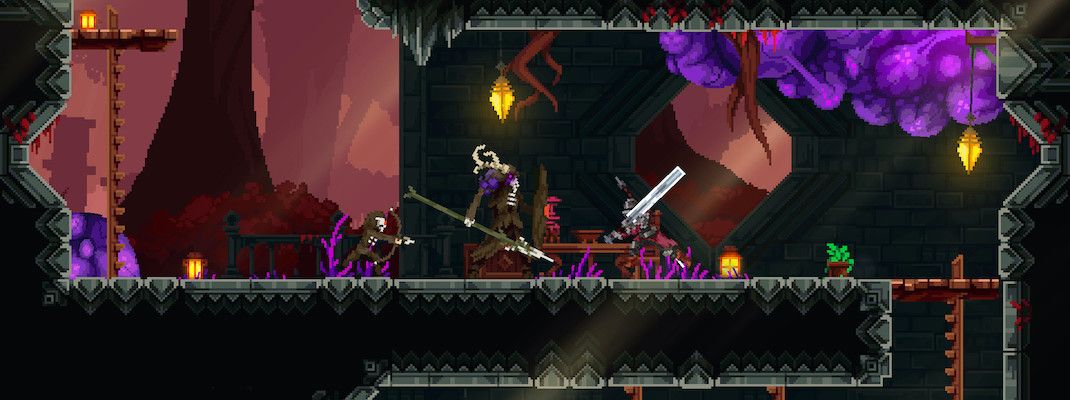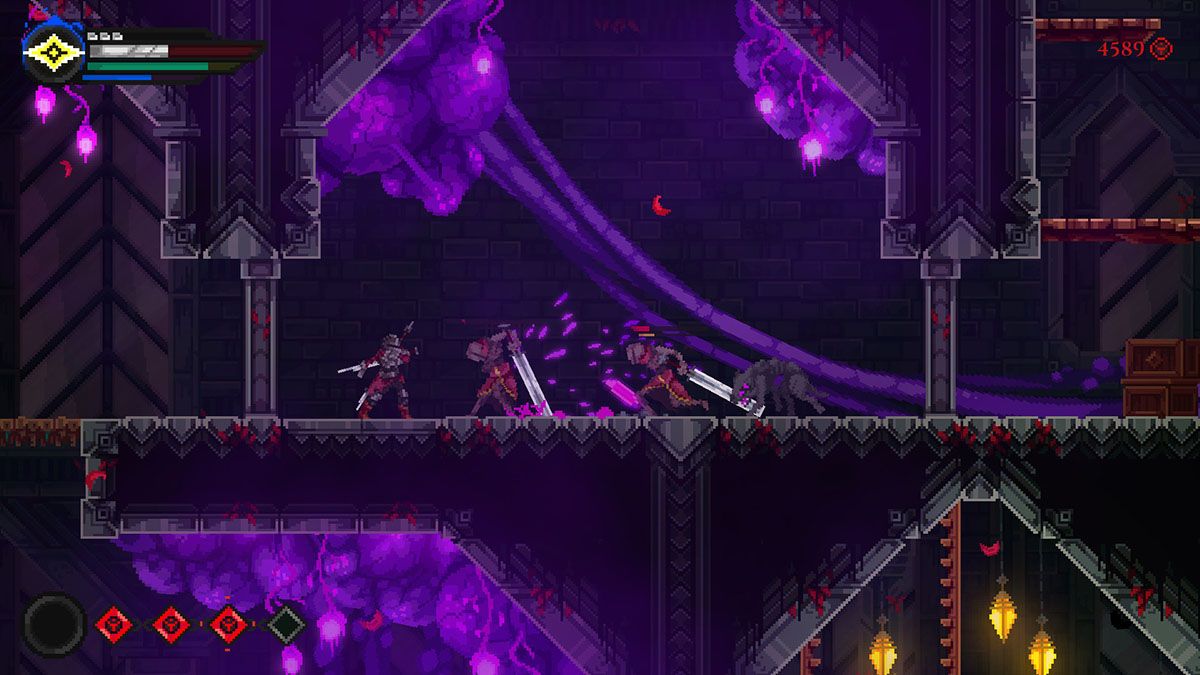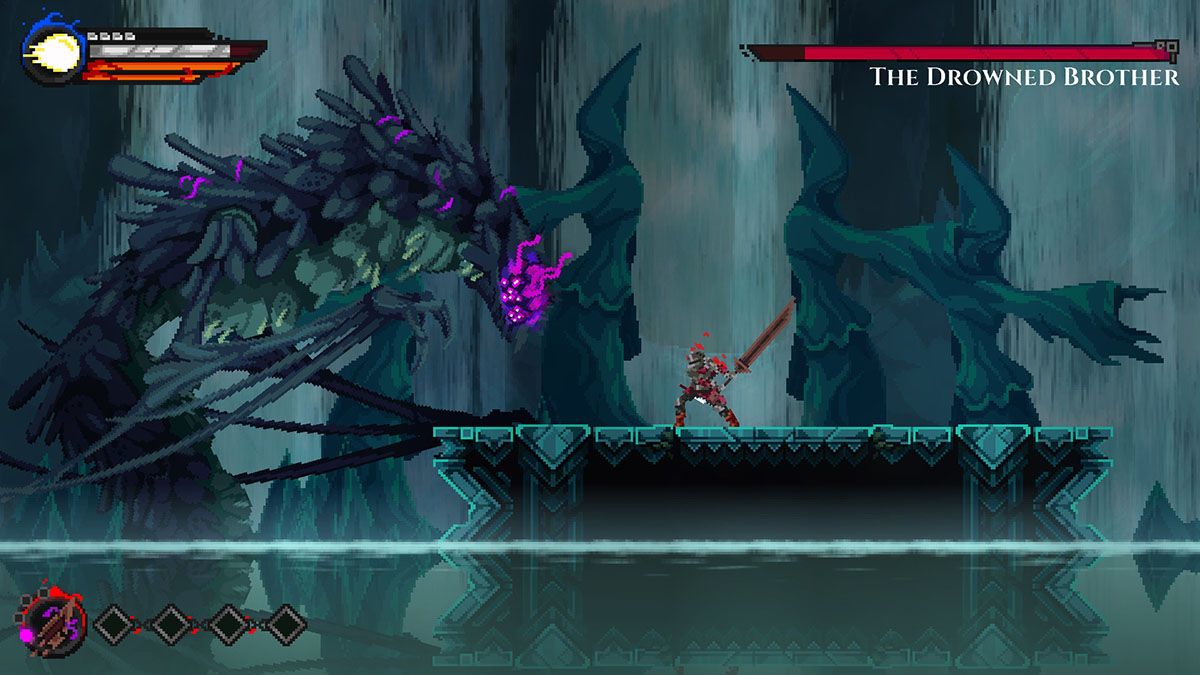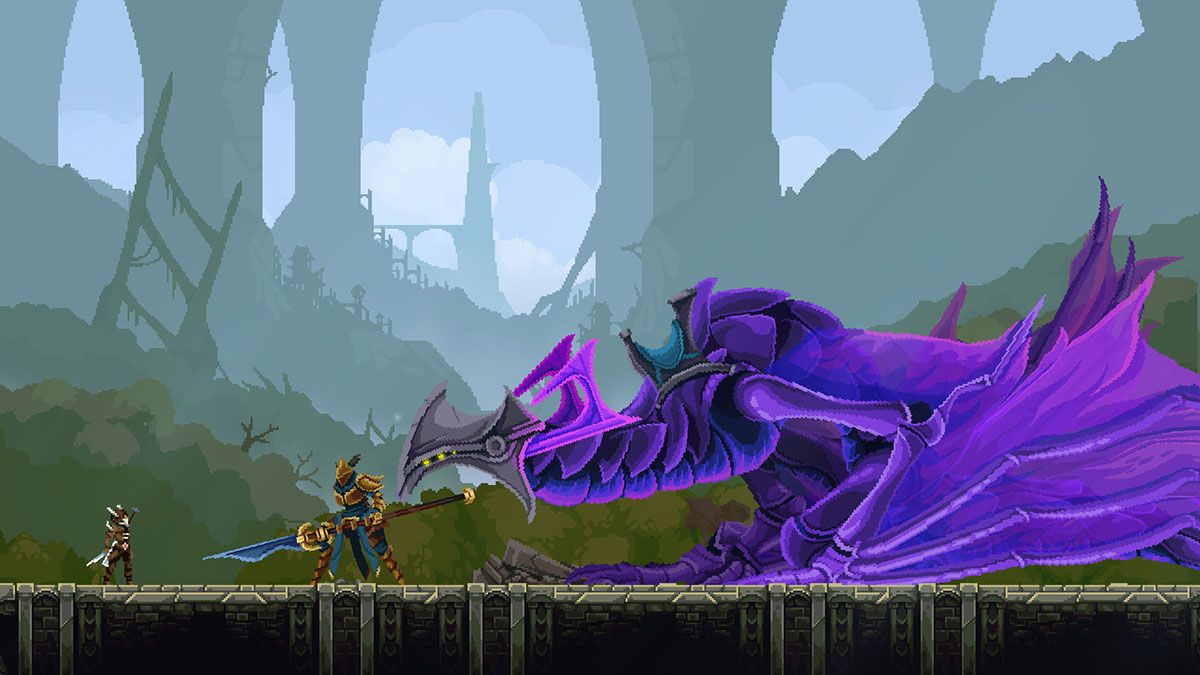Having tapped into what seemed like an unparalleled zeitgeist at the turn of the previous decade, it's no surprise to find the undisputed legacy developer FromSoftware have left on video games would be one many an imitator and inspired contemporary alike would hope to replicate. And not just limited to that of the same real-time action RPG template the Souls moniker is largely associated with. Indeed, call it an inevitability or perhaps instead some other form of deep-seated nostalgia for the 80's and 90's brand of challenge, but even the broad and continuously-populated genre that is the action-platformer has itself found a fair few efforts to inject the dread and the depravity of former into that of two dimensions.
Hollow Knight, Salt & Sanctuary, Blasphemous -- games of distinctly different artistic flair, scale and gameplay complexity, but one universal trait binding them all, is of course that dark, fantastical mythos of its setting. And with it, the perilous journey to overcome the eventual challenges pitted in one's journey. In many ways this is a perfectly-amalgamated summary of The Tarnishing of Juxtia and one you needn't require any more elaboration on, for better or worse. The latest action-platformer by developer Actual Nerds, at worst feeling more a checking-off of all those same familiar traits you're no doubt aware of, if not already getting tired of seeing repeated. A semi-vague narrative calling back to some prior, harrowing apocalypse of sorts; a world infested with all manner of physical, magical and at times technological macabre. Then there's the actual gameplay and meat of its core loop with a myriad of weapons, armor, items to equip -- interspersed by frequent trips to this game's rendition of that coveted healing/regrouping spot in the form of water fountains.
To get straight to the point, it's hard to argue the case The Tarnishing of Juxtia is doing anything new, original or even wholly exciting here, or at least providing anything of substance that breaks enough away from the expected norm. Enough to denote Actual Nerds' interpretation of real-time combat an easy look-in. Eldest Souls this is not. On paper, that prospect may already sound off-putting. Even if you're the type -- coming off the back of a game like Blasphemous for example -- to happily indulge in this well of self-imposed heartache. But if nothing else, Juxtia undoubtedly nails both the basics as well as its own sense of scale and self-importance in crafting a game that is atypically Souls-like, perhaps to a fault. A game (amateurish mistakes and head-beating boss battles included) you can complete in around seven to eight hours and feel confident a second look isn't warranted. And that eventuality is at first down to the rather standard form of real-time combat in two planes.
You have your standard attack, dodge-roll and optional magic attacks -- all of which governed by the recognizable staple of three bars at the top-left of your screen indicating health, stamina and mana. There's slight nuance to this formula, coming in the form of a frenzy-style trigger initiated after striking enemies a select number of times as indicated by a select number of icons at the bottom of the screen. Fill up all icons and you enter a temporary period where your stats gain a slight increase. It's a small inclusion, but a welcome one that encourages players to keep actively engaged in combat rather than playing things too passively. Killing foes nets you with currency that you can spend on upgrading stats at one of many large fountains dotted about the map. A couple of annoyingly-distant placements aside, the game is generally charitable when it comes to providing welcome respite between the ongoing struggle. Smaller fountains for example, though lack the ability to upgrade one's self, still serve as a means to recoup one's maximum amount of healing items. And while it too won't be winning any prizes for originality, the revelatory discovery of a short-cut and subsequent unlocking of a gate or helpful lift is never too far away either.
The downside to this, though, is that the world of The Tarnishing of Juxtia can come off as too basic. As this is a game more action-platformer than it is say a Metroidvania, it means level design can feel straightforward without much in the way of exploration of experimentation. While there are optional rooms to visit -- and with it mini-bosses of sorts guarding precious items and gear -- this is as far as the game goes in tempting you off the straight-and-narrow that is its main figurative beats. Not that the aforementioned beats and the drive to get there isn't enjoyable in its own right. Which is where thankfully the game makes up for in its combat scenarios, namely enemy design. At its best, providing genuinely sneaky and clever ways to trip players up without them noticing first-hand. One notable example coming in the form of an enemy that baits you into a dodge-roll. Another, by way of one of the major bosses, requiring you to properly memorize its attack patterns and perfectly nail the timing.
Aesthetically, it's an assortment of set-ups you've seen done numerous times in countless games prior, but encounters at least remain addictive to get right and inevitably satisfying to triumph over. Not all scenarios -- particularly when it comes to those same story-oriented bosses -- come away themselves unscathed in their execution. The deliberate restricting of two dimensions means one's screen can at times get too cluttered to keep an eye on everything going on. And in the case of overlapping enemies, most of which partaking in some form of attack at the time, be it projectile/AoE/melee, Juxtia doesn't always manage to strike the right balance between challenging and manageable. One enemy obscuring the tell of another enemy's strike, all while the restrictive maneuverability of your dodge-roll and running animation -- in a game that lacks a sprint function -- doesn't always result in a control scheme without some occasional frustration.
A consolation to this unsatisfying chaos of sorts comes in the form of the trove of passive abilities and special moves you eventually accrue over-time. Allowing you to equip two "brands" -- serving as special attacks powered by your magic meter -- optional buffs/trade-off stats, via "gifts" that increase one attribute while sacrificing another. And then there are abilities gained from slaying bosses that surprisingly of all, result in many a swapping in and out of. While this level of sufficient customization and variety in offensive options applies to the assortment of weapons -- some of which come with a heavier, charge-up attack -- this goes doubly-so for the latter-mentioned Relics acquired from defeated bosses. It's no exaggeration to note on how tempting it is to swap between a fair number of these abilities. Particularly when you consider they follow the same trade-off concept and in some cases can have their actual output stacked based on how many times you're able to land a successful strike on foes. Amidst all the fleeting positives and moments of pleasantries the game offers, this one mechanic is by far the most satisfying aspect the game manages to impress with.
Closing Comments:
Hard as it may be -- and only increasing in difficulty the further the years rolls on -- to truly stand out in a crowded and competitive market that is the glaze of Souls-like appeal, where The Tarnishing of Juxtia may not be scoring high on originality, it just about makes up for in heart and dedication. A collective of systems and mechanics, while not necessarily impressive or noteworthy on their own, do band together to form a cohesive and modestly-enjoyable whole. One not without that signature burst of frustration and desire to see one's self triumph over via an assortment of sufficiently-designed boss battles and similar spots of clever enemy design with their own respectable tricks on top. Those looking for something more fleshed out and demanding of a deeper trudge through its own brand of desolation may feel short-changed, but The Tarnishing of Juxtia just about manages to stay the course and avoid getting too indulgent in its blatant inspirations. A committed action-platformer that doesn't outstay its welcome.




